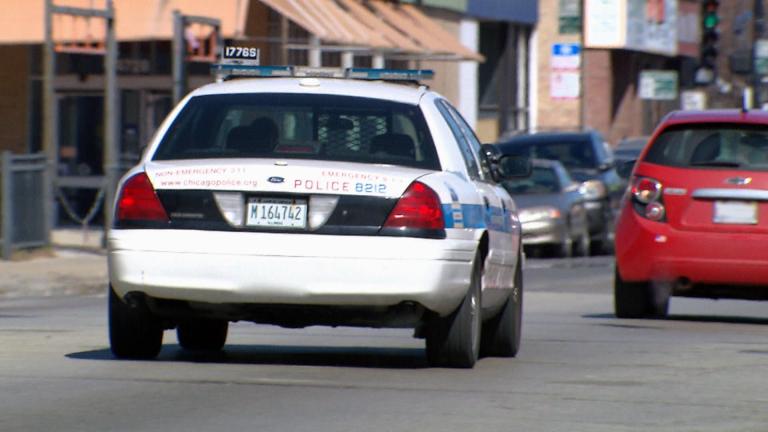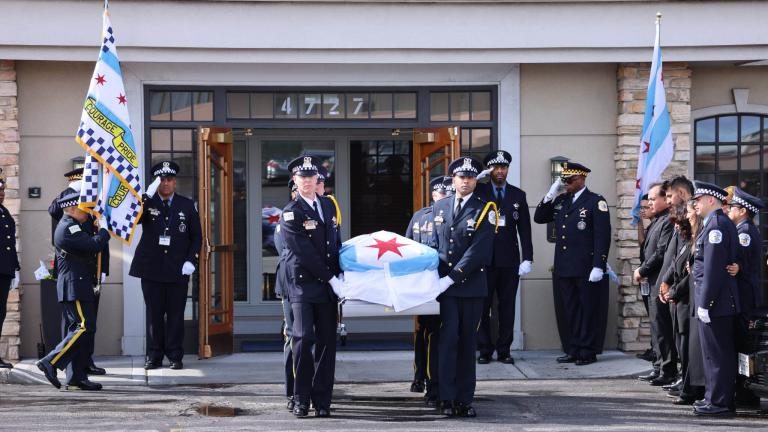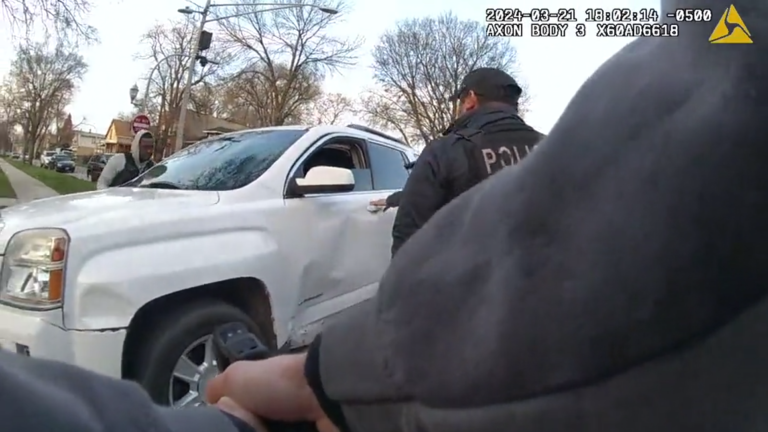This story is part of Policing: A “Chicago Tonight” Special on the anniversary of George Floyd’s murder.
Chicago has been grappling with issues surrounding policing long before the murder of George Floyd by a Minneapolis police officer one year ago. But as it did across the country, Floyd’s killing led to outrage and calls for change.
In Chicago, a coalition of abolitionists came together to form the Defund CPD campaign.
Alycia Kamil, a 20-year-old organizer with the group, said looking back at the past year is bittersweet.
“I’m glad people are noticing and recognizing that this is wrong but also I think about all of the other hundreds of Black people that have died before this year that we needed the same reaction of uprising too,” she said. “The uprisings really showed that … it was almost like every single day somebody was getting murdered by the police. It started with George Floyd, there was people before George Floyd, but it was after George Floyd, like you could go on Twitter, on Facebook, on Instagram and it was somebody harmed, somebody murdered, somebody kidnapped, somebody being disappeared. So I think that the uprising, it caused a spark for people to really want to find ways to get involved.”
Kamil said people started asking questions about her organizing and activism work. Defunding the force, she says, is a step toward abolishing the police department completely.
The initial ask they’re fighting for: taking away 75%, or $1.2 billion, from the Chicago Police Department’s budget so it can be reallocated and spent on reopening closed schools and mental health clinics.
“When we take money away from people who are supposed to be helping us, from people whose job descriptions are to protect and serve, and we’re actually putting into community and trusting it to our community elders, people who are really respected in the community, to take care of issues, to solve issues. It’s about really reinvesting into Black and Brown communities,” Kamil said. “So it’s a step toward abolition because once people see: when we have the resources ourselves in Black and Brown spaces and other marginalized groups, we see that we don’t need what we’ve been indoctrinated to believe what policing actually is, and we start to reimagine what public safety actually looks like for Black, Brown and marginalized communities.”
Ald. Rossana Rodriguez Sanchez (33rd Ward) ran on the premise that police were getting too much funding while communities weren’t getting the resources they needed to stay safe — a notion that used to be politically risky; political convention always relied on trying to solve issues by giving more money to the police, for everything from hiring more officers to surveillance.
“But what I am seeing is that we are moving in a direction to move away from punishment and incarceration and theft and move in a direction that makes people whole,” she said.
John Catanzara, the president of Chicago’s Fraternal Order of Police, says diverting money from CPD will leave officers less protected.
“We are not the problem. These neighborhoods need more police. And the problem isn’t necessarily the police, it’s the prosecution aspect of not keeping offenders in jail,” Catanzara said.
A lot has changed regarding policing, and public sentiment about it, in the year since Floyd’s death, though he said the attention is unwarranted.
“The sad reality of that whole situation is that it was labeled as if it was a pandemic or epidemic itself and a nationwide issue that was going on everywhere with every officer that ever wears a badge,” he said. “And it just was a false narrative from the get-go. It was a one-off, like many of these situations.”
Police are using the same tried and tested practices, he said, it’s just that technology and body cameras mean that the public is more aware of those practices.
The common link between many situations in which police use force, he says, is that the suspect flees or otherwise doesn’t cooperate with an officers’ demands.
The Floyd situation is an exception, as he describes it.
Catanzara said Chauvin inappropriately used excessive force from the moment Floyd stopped breathing.
“This was not some perfect role model of an epidemic of law enforcement abuse or excessive force nationwide. It was a ridiculous narrative. Unfortunately, a lot of race-baiting squeaky wheels used that to their advantage to further their own narrative and made law enforcement even more vilified than ever before,” he said.
To him, that includes Chicago Mayor Lori Lightfoot. Catanzara said the mayor shows no appreciation or respect for Chicago police.
The FOP recently issued a vote of no confidence in Lightfoot and police Superintendent David Brown.
Lightfoot, who previously called Catanzara a “clown” and a “total fraud,” told reporters she’ll wear the vote like a badge of honor.
But Catanzara said it’s not a personal vendetta between them – this was a vote of the membership.
Catanzara said he does agree with Lightfoot that more money is needed in communities long subject to disinvestment. But he says it should come from elsewhere – not the CPD’s budget.
Sanchez says the CPD’s budget is the perfect place to help fund the Treatment Not Trauma initiative she sponsored.
A pilot program in the works will send clinicians or paramedics — sometimes with crisis-intervention trained police officers, sometimes not — in response to mental health situations.
“If you start thinking about the fact that this would be a model that would take work off the plate of the police department, you would think, well, this is money that we could divest,” she said. “But that hasn’t happened yet.”
The alderwoman says what Chicago’s doing now, relying on police to end violence, isn’t working.
The phrase “defunding the police” has taken on a lot of meaning for different people and can trigger a battle of semantics.
“There’s a lot of different ways to do that (defund the police). I think that the part that we are missing in the conversation is we need to create the systems of care that are not in place right now in order to be able to prevent violence and in order to be able to address when inter-personal and inter-community violence happens,” she said.
“What exactly are we investing in with the system we currently have? It doesn’t work. It absolutely doesn’t work. So when we say defund, we need to make sure that we are divesting from police, creating the systems that we need to replace punishment with, and create systems that are humane and make people whole,” Sanchez said.
The Defund CPD Campaign is holding a resistance training Wednesday night, and will be part of a rally Saturday.
Follow Amanda Vinicky on Twitter: @AmandaVinicky








